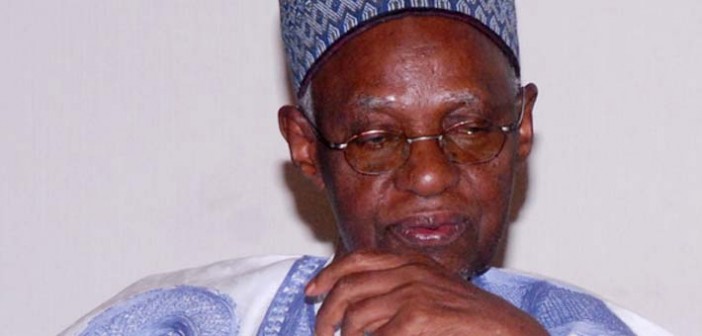The recent 90th birthday celebration of former Nigerian President, Alhaji Shehu Usman Aliyu Shagari, presents a good opportunity for Nigerians to salute the elder statesman and appreciate his contributions to the development of the country.
The occasion, which was marked in Sokoto last Wednesday, attracted President Goodluck Jonathan who led four of the nation’s former leaders – Generals (retd) Yakubu Gowon, Ibrahim Babangida, Abdulsalami Abubakar and Chief Ernest Shonekan – to felicitate with him on the great milestone.
Jonathan used the occasion to laud the sterling qualities of Shagari, whom he rightly described as a role model to Nigerian leaders. The president further stressed that his administration would continue to count on Shagari’s support and solidarity. The torrents of good wishes for the former president include those from Gen. Muhammadu Buhari (retd), who toppled his regime in a military coup in 1983. Buhari, in a message from London, described Shagari as the grand old man of Nigerian politics who has always shown him “civility and much courtesy” in spite of the coup.
Similarly, former President Olusegun Obasanjo, who visited Shagari shortly after Jonathan’s entourage left, described him as a friend and the doyen of all former heads of state. He said that he was proud to have handed over power to Shagari in 1979 in a smooth and transparent transition government. Also, former governor of Abia State and renowned industrialist, Dr. Orji Uzor Kalu, eulogised Shagari as a rare and detribalized leader who has contributed positively to the social, economic and political development of the nation.
We add our voice to the streams of accolades trailing Shagari on the occasion of his 90th birthday. The tributes that he has received are all well deserved. Shagari is, indeed, a quintessential leader whose humility, forthrightness, patience and respect for the Nigerian people are worthy of emulation by politicians in the country. Since he emerged on the national landscape with his appointment as a member representing Sokoto West in the House of Representatives, Lagos (1954-1956), he has creditably discharged his responsibilities in all the public offices that he has held.
His stint as Nigeria’s president between 1979 and 1983 witnessed the introduction of developmental schemes such as the Green Revolution programme, which is no longer in operation today, just like many other agricultural schemes introduced by his predecessors and successors in that office.
Born on February 25, 1925 in Shagari, Yabo, Sokoto State, Shagari began his early education at Yabo Elementary School, 1931-35. He thereafter studied at the Sokoto Middle School, 1935-40; Kaduna College, 1941-44; Teacher Training College, Zaria, 1944-45. He served as a teacher in Sokoto Middle School, 1935-40; headmaster, Argungu Senior Primary School, 1951-52; senior visiting teacher, Sokoto Province, 1953-58.
He was, among others, the Federal Minister of Economic Development, 1959-60; Federal Minister of Internal Affairs, 1962-65; Federal Minister of Works, 1965-66 and Federal Commissioner for Finance, 1971-75.
A member of the Constituent Assembly from1977 to 78, he was elected president of Nigeria in 1979 under the defunct National Party of Nigeria (NPN) and re-elected for a second term in office under the same party in 1983. His second term in office was, however, short-lived as he was toppled in a coup in December 1983. He was subsequently put under house arrest for many months between 1984 and 1986 and later granted full freedom in 1988.
Although his administration was accused of large scale corruption, while the nation’s economy under his watch was adjudged to be in bad shape, Shagari was never accused of, or found guilty of corruption. His administration will also be remembered for the Ethical Revolution programme which was aimed at putting the country on the path of moral rectitude.
We join Nigerians in sending warm greetings to Shagari on his 90th birthday. His attainment of the age of 90 in this part of the world where life expectancy is so low is no mean achievement. In and out of office, Shagari has remained a gentleman to the core. Since he quit active participation in the nation’s politics, he has conducted himself with the greatest restraint and integrity, and has kept clear of controversies.
He has, nevertheless, spoken up to smoothen frayed nerves in the national interest whenever there are burning issues that deserve the intervention of highly respected Nigerians.Alhaji Shagari is, indeed, a true elder statesman who does not seek undue limelight. His shining example and worthy legacies are deserving of emulation by the present crop of politicians. We wish him joy, good health and more happy returns of this occasion.















































